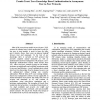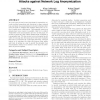123 search results - page 10 / 25 » Modelling the relative strength of security protocols |
IPPS
2007
IEEE
14 years 1 months ago
2007
IEEE
Most of the current trust models in peer-to-peer (P2P) systems are identity based, which means that in order for one peer to trust another, it needs to know the other peer’s ide...
SAC
2009
ACM
14 years 2 days ago
2009
ACM
In recent years, it has become important for researchers, security incident responders and educators to share network logs, and many log anonymization tools and techniques have be...
AAI
2004
13 years 7 months ago
2004
We are interested in applying model checking techniques to the verification of communication protocols which require safe communication. Typically, in such scenarios, one desires ...
PROVSEC
2009
Springer
14 years 1 months ago
2009
Springer
Secure set-intersection computation is one of important problems in secure multiparty computation with various applications. We propose a general construction for secure 2-party se...
CSFW
1999
IEEE
13 years 11 months ago
1999
IEEE
Most formal approaches to security protocol analysis are based on a set of assumptions commonly referred to as the "Dolev-Yao model." In this paper, we use a multiset re...


